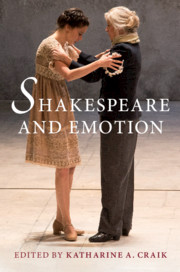Book contents
- Shakespeare and Emotion
- Shakespeare and Emotion
- Copyright page
- Contents
- Figures
- Contributors
- Acknowledgements
- Note on Text
- Introduction
- Part I Contexts
- Chapter 1 Rhetoric
- Chapter 2 Medicine
- Chapter 3 Religion
- Chapter 4 Character
- Chapter 5 Inheritance and Innovation
- Chapter 6 Communities
- Chapter 7 Audiences
- Chapter 8 Acting
- Chapter 9 Bollywood
- Chapter 10 Language
- Chapter 11 Emotional Labour
- Chapter 12 Passionate Shakespeare
- Part II Emotions
- Bibliography
- Index
Chapter 8 - Acting
The Taming of the Shrew, Coriolanus
from Part I - Contexts
Published online by Cambridge University Press: 01 October 2020
- Shakespeare and Emotion
- Shakespeare and Emotion
- Copyright page
- Contents
- Figures
- Contributors
- Acknowledgements
- Note on Text
- Introduction
- Part I Contexts
- Chapter 1 Rhetoric
- Chapter 2 Medicine
- Chapter 3 Religion
- Chapter 4 Character
- Chapter 5 Inheritance and Innovation
- Chapter 6 Communities
- Chapter 7 Audiences
- Chapter 8 Acting
- Chapter 9 Bollywood
- Chapter 10 Language
- Chapter 11 Emotional Labour
- Chapter 12 Passionate Shakespeare
- Part II Emotions
- Bibliography
- Index
Summary
In this essay I consider how an early modern understanding of the passions might inform the practice and analysis of acting in the theatre today. Taking the idea of being ‘moved’ quite literally, I argue that early modern subjects were ‘moved’ when the humours moved through the body, and the body moved passionately about the world. ‘A woman moved is like a fountain troubled’, says Kate in her final, notorious speech of gendered conformity in The Taming of the Shrew, in which she describes men moving about in the world while women must stay, unmoved, at home. I argue that recent, inward, and static conceptions of the emotions tend to occlude the relationship between the emotional and the political in the theatre now. I suggest instead that rehearsal room consideration of early modern ideas about dynamic emotion/motion might recuperate the political agency and import of emotional life in the plays of Shakespeare and his contemporaries. In making this argument, I move between analysis of a Shakespearean comedy and a tragedy (The Taming of the Shrew and Coriolanus), considering both plays in performance and making suggestions for rehearsal practices.
- Type
- Chapter
- Information
- Shakespeare and Emotion , pp. 122 - 135Publisher: Cambridge University PressPrint publication year: 2020



